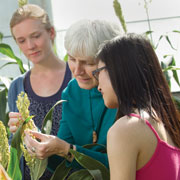Are the benefits of genetically engineered food worth the risks?
QUEST Television Special
View it now: Link to video
The half-hour documentary "Next Meal: Engineering Food," investigates genetically engineered crops and explores how they are made, their pros and cons, and what the future holds for research and regulations. Cooperative Extension Specialist Peggy Lemaux and members of her lab are featured.
 Proposition 37 would have required foods containing genetically engineered ingredients to be labeled in California. The measure narrowly lost at the ballot box, where it received 49 percent of the vote. But the initiative won in the Bay Area, where genetically engineered food remains a controversial issue. In the documentary, the KQED science team sought to carefully consider the promise of genetically engineered crops and the concerns surrounding them.
Proposition 37 would have required foods containing genetically engineered ingredients to be labeled in California. The measure narrowly lost at the ballot box, where it received 49 percent of the vote. But the initiative won in the Bay Area, where genetically engineered food remains a controversial issue. In the documentary, the KQED science team sought to carefully consider the promise of genetically engineered crops and the concerns surrounding them.
- The documentary includes visits to the labs of two Northern California biologists. Lemaux's efforts aim to engineer crops to reduce malnutrition in developing countries. Eduardo Blumwald, UC Davis, who also will be featured, focuses on engineering crops to withstand the negative effects of climate change.
- Learn the history of the first genetically engineered food to reach the market in 1994 -- a popular, yet short-lived tomato created at Calgene in Davis.
- Meet a farmer in Los Banos who is reaping economic benefits after switching from conventional to genetically engineered alfalfa.
- Listen to a Marin County organic dairyman who has concerns that there may be health and environmental harm associated with genetically engineered crops, and who fears they could contaminate the organic hay he feeds his cows.
- Hear from California anti-genetically engineered food activists and from Monsanto.
Link to Peggy Lemaux's Page on pmb.berkeley.edu
Link to ucbiotech.org, the outreach website created by Lemaux and assistant Barbara Alonso as part of the outreach efforts of her position the University of California Cooperative Extension.
